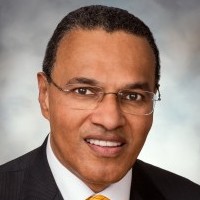 Freeman A. Hrabowski, III, president of the University of Maryland Baltimore County has announced his plan to retire at the end of the 2021-2022 academic year. President Hrabowski is nationally celebrated for his results-driven commitment to inclusive excellence, collaborative approach to leadership, and mentorship to increase the participation of students from underrepresented groups in STEM fields.
Freeman A. Hrabowski, III, president of the University of Maryland Baltimore County has announced his plan to retire at the end of the 2021-2022 academic year. President Hrabowski is nationally celebrated for his results-driven commitment to inclusive excellence, collaborative approach to leadership, and mentorship to increase the participation of students from underrepresented groups in STEM fields.
President Hrabowski is perhaps best known for partnering with Robert Meyerhoff to found the Meyerhoff Scholars Program in 1988, to increase the diversity of STEM leaders. Science describes the program as the “gold standard for providing a path into academic research” for students from underrepresented groups. So far, UMBC has graduated more than 1,400 Meyerhoff Scholars with STEM degrees. More than 800 have already earned graduate or professional degrees. According to National Science Foundation data, UMBC is now the nation’s top producer of Black graduates who go on to earn a Ph.D. in the natural sciences and engineering.
Dr. Hrabowski has served as president of the University of Maryland Baltimore County since 1992. He is the author of several books including Holding Fast to Dreams: Empowering Youth From the Civil Rights Crusade to STEM Achievement (Beacon Press, 2015).
Barack Obama named him to chair the President’s Advisory Commission on Educational Excellence for African Americans in 2012. The following year, his TED talk “Four Pillars of College Success in Science” made waves worldwide, going on to receive more than one million views.
A native of Birmingham, Alabama, President Hrabowski is a graduate of Hampton University in Virginia, where he majored in mathematics. He holds a master’s degree in mathematics and a doctoral degree in higher education administration from the University of Illinois.













We have more so-called native born Black Americans with PhDs (e.g., STEM and non-STEM) in 2021 as compared to a mere 20 years and the overall conditionality of the Black community has not improved. Therefore, the so-called Black community should not be in the business of pontificating about individual success as compared to collective group success. Until that mindset changes the so-called Black community will literally remain stagnant.
It is tiring and irritating to see and read HBCU Watch’s takes
Hey J,
No one is forcing you to read my comments. I would venture in saying you feel this way because you fall in the category of these so-called Black academics who I hold accountable. In other words, you’re probably just another status-quo, neoliberal, politically correct, and Boule and so-called Black Greek card carrying member whose done nothing for the collective Black community. I could be wrong but I doubt it.